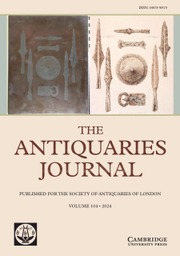Article contents
Two Medieval Love-Songs set to Music
Published online by Cambridge University Press: 08 January 2012
Extract
It was recently my good fortune to discover in the Muniment Room of King's College, Cambridge, in a very unusual situation, the manuscript of a fourteenth-century love-song. Mr. Flower kindly drew my attention to a love-song of the early sixteenth century preserved in a rather similar manner at the Public Record Office. Both manuscripts included musical settings. That of the fourteenth-century song, Bryd one brere, has been edited and arranged by Mr. F. McD. C. Turner, of Magdalene College, Cambridge; that of the song from the sixteenth century by Professor E. J. Dent, of King's College; and they will be found in later sections of this paper. Meanwhile I shall endeavour to describe the manuscripts themselves, the literary texts of the two lyrics, and what can be inferred of their history.
- Type
- Research Article
- Information
- Copyright
- Copyright © The Society of Antiquaries of London 1935
References
page 1 note 1 These texts, with brief notes, have already been published separately: Two Medieval Lyrics, ed. Saltmarsh, John. Cloanthus Press, Cambridge, 1933Google Scholar.
page 1 note 2 Mon. Ang. v, 105, and Oliver, G., Monasticon Diocesis Exoniensis, 191Google Scholar, date the foundation before 1146 and before 1143 respectively; but Matilda's charter of confirmation (King's College Muniments, 2 W. 1; Mon. Ang. v, 107) is assigned by Round, J. H. to the year 1142 (Geoffrey de Mandeville, 170 n. 8)Google Scholar. For this reference I am indebted to Miss Rose Graham.
page 2 note 1 ‘Thomas Dene was certainly prior in 1428, and was, we believe, the last who filled that office’ (Oliver, , Mon. Dioc. Exon. 192)Google Scholar. But the ‘keeping’ of the Priory had been assigned to Queen Joan, John de Tibbay, and Thomas Ferriby as early as 1414 (Letters Patent of 27 Jan. 1 H. 5, in Calendar of Patent Rolls, Henry, V, i, 166)Google Scholar.
page 2 note 2 By Letters Patent of 15 July, 22 H. 6 (K. C. Muniments, 2 W. 1; Cal. Pat. Rolls, Henry, VI, iv, 279)Google Scholar.
page 2 note 3 K. C. Muniments, 2 W. 32.
page 2 note 4 Professor Minns tells me that the hand is probably either English or North French.
page 3 note 1 Throughout this paper I am most deeply indebted to Miss Murray for guidance in all matters of language and metre. Without her generous help I could never have attempted to discuss these topics; she has saved me from committing serious mistakes; and any credit is due to her instruction, though the responsibility for the views put forward is wholly mine.
page 4 note 1 Johnson, Charles and Jenkinson, Hilary, English Court Hand, i, 33Google Scholar.
page 5 note 1 The English Dialect Dictionary quotes a Northumbrian example from the year 1895Google Scholar. The allied adjectival or adverbial form gradely also survives in dialect.
page 6 note 1 e.g. Johnson, and Jenkinson, , English Court Hand, 6Google Scholar: ‘14th Century: The notched b disappears very early, giving place to a simple looped b …, and in course of time the loop gives place to a mere hook …, the angle of the hook becoming gradually sharper.’
page 6 note 2 Johnson, and Jenkinson, , op. cit. xxiGoogle Scholar.
page 7 note 1 Böddeker, , Altenglische Dichtungen des MS. Harl. 2253, 148Google Scholar.
page 7 note 2 It will be noticed that these directions do not apply to the text as printed with the music on p. 20; whoever first joined words to tune seems to have stretched the former to fit the latter.
page 8 note 1 See my remarks on craue on p. 7 above.
page 9 note 1 Kiss.
page 10 note 1 Graham, Rose, English Ecclesiastical Studies, 46Google Scholar.
page 10 note 2 Ibid 107.
page 10 note 3 Bittedene is stated to have been instituted by Bishop Grandisson's predecessor (Register of John de Grandisson, ed. Hingeston-Randolph, F. C., ii, 781)Google Scholar; presumably James de Berkeley, Bishop of Exeter from March to June 1327.
page 10 note 4 Register of John de Grandisson, i, 289.
page 10 note 5 Ibid., i, 305, 309.
page 10 note 6 Ibid., i, 279.
page 11 note 1 Ibid., ii, 883.
page 11 note 2 Ibid., i, 58–9.
page 12 note 1 P.R.O., E. 163/22/1.
page 13 note 1 Though.
page 14 note 1 Thus.
page 14 note 2 Be so hard put to it.
page 14 note 3 Once.
page 14 note 4 Bring to pass (an intransitive use).
page 14 note 5 Songs and Madrigals of the Fifteenth Century, 3.
page 15 note 1 Hoccleve's Works, ed. Furnivall, F. J. (Early English Text Society), i, xiii, 59, 64Google Scholar.
page 16 note 1 Tillyard, E. M. W., The Poetry of Sir Thomas Wyatt, 15–16Google Scholar.
page 18 note 1 Songs and Madrigals of the Fifteenth Century, 9.
page 18 note 2 Chambers, and Sidgwick, , Early English Lyrics, 85Google Scholar; Hawkins, iii, 25.
- 1
- Cited by


